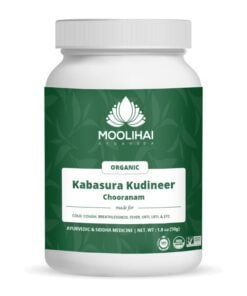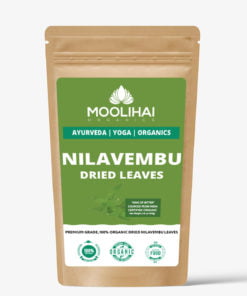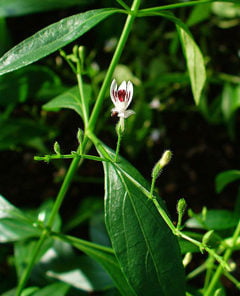Guide
Amazing Health Benefits of Nilavembu

Nilavembu is one of the most effective traditional herbs that is widely used in Siddha and Ayurveda since ancient times. It is also known as King Of Bitters because of its effective treatment.
It contains antipyretic, hepatoprotective, digestive, cholagogue, and anti-inflammatory properties. It has been used as a traditional medicine to treat various diseases in Ayurvedic, Siddha medicines, Unani, Chinese remedies, Homeopathy, and tribal medicine.
This herb is the great remedy for different types of treatments such as intermittent fever, dengue fever, chikungunya, malaria and chronic fever.
About Nilavembu
Nilavembu is a medicinal plant that belongs to the Acanthaceae family, and the scientific name of this plant is Andrographis paniculata.
This is an annual herb that grows up to 30-110 cm height, and it grows around the autumn season and is widely cultivated over Asia.
It contains quadrangular, dark green stems with longitudinal furrows and winged-angle at the younger parts. The leaves of this plant are lanceolate, glabrous, green in color, pinnate, and it is arranged in the manner of opposite decussate on stems.
It bears small flowers that have linear-oblong capsules as fruits, which contain lots of yellowish-brown and sub-quadrate seeds.
Due to a powerful herb in Siddha and Ayurveda, it is broadly used in various Ayurvedic medicines that are used to enhance your immune system and eliminate harmful toxins from your body.
Apart from relieving many types of infectious fever, this herb provides a traditional effective remedy for improving liver function metabolism, digestion, enhancing physical debility or fatigue, appetite, and promotes kidney functions.
When it comes to skin diseases, constipation, blood disorders, fatty fever, loss of appetite, intestinal parasite, this effective herb provides great relief to all.
Synonyms of Nilavembu
Nilavembu is a useful immune booster herb that contains different names such as Kalmegh, Kalmegha, Kirata Tikta, Alui, Yavtika, Green Chirata, Bhumi Nimbak, Hempedu Bumi, Kalpanatha, Vishwambhar, and Bhu Nimba.
Common Names of Nilavembu:
Botanical Name: Andrographis paniculata
English Name: Andrographis, Kriate
Tamil Name: Nilavembu
Malayalam Name: Nelavepu, Kiriyath
Telugu Name: Nelavemu
Kannada Name: Nelabevu
Hindi Name: Kirayat, Kalpanath
Marathi Name: Kadu kirayata, Oli Kiryata, Kalpa
Urudu Name: Nain-e-havandi
Unani Name: Kariyat
Sanskrit: Kirata
Chemical Compounds of Nilavembu
Nilavembu is very popular as a powerful antipyretic and expectorant herb, and it contains rich sources of lactones, flavonoids, diterpenoids, and flavonoid glycosides. The main component is Andrographis extract and andrographolide. These components contain many medicinal properties including antioxidant, laxative, digestive, anti-inflammatory, hypoglycaemic, vermicidal, hepatoprotective, and cholagogue.
Ayurvedic Indications of Vilavembu
The holistic science of Ayurveda considers this rejuvenating herb as Kalmegh. This effective herb has been used in many treatments includes Kasahara, Pachana, Deepana, Rochana, Shwasha, Jvara, Vayasthapana, Vamana, Anulomana, Mehahara, Balya, Amahara, Kantya, Rasayani, Dahahara, Balya, Trutahara, Triptighno, Prameha, Shonitasthapana, Hikkanigrahana, Shonitasthapana and Vamanopaga, Kamala, Pandu, Hridaya, Kustha, Sangrahini, Arsha, Krimihara, Varnya, and Krichra.
Ayurvedic Formulation of Nilavembu
Nilavembu Kashayam is very popular, and the powdered form is well-known Siddha medicine in South states of India. The effective medicinal composition of nine herbal components in Churnam provides great treatment and prevents all kinds of infections. It is widely used in many Ayurvedic formulations that not only improve your immune system and also helps to cure various symptoms like body aches, fatigue, muscle aches, weakness, loss of energy, headache. It is greatly beneficial for muscle pain, joint swelling, joint pain, and rashes related to some infectious diseases like Chikungunya.
Preparation of Nilavembu Chooranam
Ingredients
- Andrographis Paniculata – 1 part of Nilavembu
- Plectranthus Vettiveroides – 1 part of Vilamichai ver
- Cyperus Rotundus – 1 part of Mustak
- Vetiveria Zizanioides – 1 part of vetiver
- Zingiber Officinale – 1 part of Sonth
- Santalum Album – 1 part of Safed Chandan
- Piper Nigrum – 1 part of Kali Mirch
- Mollugo Cerviana – 1 part of Parpadagam
- Trichosanthes cucumerina – 1 part of Chichonda
Preparation Method
Take fresh parts of all the above mentioned herbs, wash them well with water to remove soil and other elements. Filter the liquid from impurities and keep the herbs in sunlight and let it dry for one week. Mix and grind the dried herb in a grinder like a fine powder. Dry the powder mixture to remove the moisture and sieve them to remove impurities. Store them in an airtight container at a cool place for the long-lasting use.
Medicinal Properties of Nilavembu
- Antipyretic
- Anti-oxidant
- Anti-inflammatory
- Anti-microbial
- Anti-diabetic
- Anti-infective
- Anti-protozoan
- Digestive
- Insecticidal
- Cholagogue
- Immunostimulant
- Bitter
- Nephroprotective
- Hepatic stimulant
- Blood detoxifier
- Hepatoprotective
14 Amazing Health Benefits of Nilavembu
1. Treats Dengue Fever
Nilavembu contains effective anti-viral properties that make this herb to ensure the symptoms of dengue, and it helps to control and prevent dengue from happening. It contains andrographolides and diterpenes that reduces the activity of anti-dengue. This herb contains the capacity to fight against dengue virus serotype 1.
2. Treats Chikungunya
The Nilavembu herb contains a bioactive constituent called andrographolide that provides powerful anti-CHIKV effects. It plays a vital role in preventing the Chikungunya virus from forming and spreading. The preparation of Nilavembu provides great treatment to reduce muscle pain, fever, joint pain, etc. Consume Nilavembu along with Ashwagandha, Tulsi, Giloy, Punarnava, and formulations like Sadanga paniya, Kaishore Guggulu, Prabal Pishti, Tribhuvan Kirti rasa, etc.
3. Treats & Prevent Malaria
The Nilavembu leaves contain anti-parasitic properties that help to prevent the malarial parasite from growing at the ring stage and also prevent the severity of the infection. The Nilavembu provides great relief from malarial parasites when you take this along with Ayurvedic formulations such as Amritarishta, Laxmi Narayan Ras, and Mrityunjay Ras, Kasish Godanti Bhasma, Sheetbhanji Ras, Praval Pishti and Tulsi.
4. Intermittent Fever
Basically, Nilavembu is used as a natural remedy to treat intermittent fever. According to Ayurveda, AMA accumulates in our body that is a toxin. It grows in the body because of indigestion problems during infections. Nilavembu helps in the treatment of intermittent fever by burning and eliminating AMA.
Also Read: Natural Herbs to Cure Fever
5. Treats Liver Problems
Nilavembu leaves are popularly known as ‘Sarva roga niramani’ that contain hepatostimulative and hepatoprotective properties to provide extraordinary relief during jaundice, and the liver gets affected in this case. It plays a very important role in treating liver problems and jaundice. Take a mixture of 1 gm powder Nilavembu leaf, 1-2 gms of Bhumi amla/Tamalki powder, 2 gms of licoric/mulethi powder with 200 ml of water. Boil the water until it reduces to 1/4 quantity/500 ml. Filter that and drink the concoction to prevent and maintain liver anomalies.
Also Read: Herbs For Healthy Liver Function
6. Nilavembu For Influenza
Nilavembu provides powerful anti-viral and anti-inflammatory properties because of the presence of bioactive constituents called andrographolide. Regular consumption of Nilavembu formulation not only prevents the replication of the influenza virus and also reduces the inflammatory mediator’s action, which is responsible for inflammation of the lungs.
7. Relieves Heart Troubles
The Nilavembu herb is also famous for its cardio-protective nature. It contains effective medicinal values to provide great treatment for heart diseases. Due to the powerful antioxidative nature, it makes your heart muscles stronger and prevents lipids from building and also decreases the risk of heart blocks, heart attacks, blood clots, etc. It does not play an important role in reducing the cholesterol level in blood and also dilates blood vessels and maintains blood flow, so it controls blood pressure.
8. Prevents & Treats Ulcers
The leaves of Nilavembu contain anti-ulcer and anti-inflammatory properties that have significance in treating various types of ulcers such as peptic ulcer, mouth ulcers, ulcerative colitis, canker sores, etc. The bioactive compound present in Nilavembu andrographolide plays a vital role to cure mouth and gastric ulcers. It also helps to increase the speed of the healing process in the affected mucosal layer and decreases the risk of ulceration.
Also Read: Best Herbs to Cure Ulcer
9. Helps in Digestion
The Nilavembu leaves contain great digestive and carminative properties that help to provide solutions to all digestive problems. The anti-flatulent properties of Nilavembu help to decrease the gas formation in the alimentary canal, so that reduces constipation, abdominal distension, flatulence, and bloating. The antacid property of this herb helps to prevent forming excessive acids in the stomach and also used to treat ulcer, gastritis, indigestion, and better absorption of nutrients in the body.
Also Read: Digestive Herbs Naturally Boost Digestion
10. Fights Respiratory Issues
Nilavembu is used as an effective traditional medicine for all kinds of respiratory problems. The leaves of this herb contain effective antibiotic, anti-inflammatory and anti-asthmatic properties so it plays an important role to treat common cough, cold and flu symptoms. It makes the rheum deposits thin and loose in your chest and nasal cavities and also makes your body to breath easily and get relief from mucus. It is also useful for treating asthma and bronchitis conditions. The regular consumption of this herb strengthens your lung tissues and improves lung health.
Also Read: Herbs to Support Lung and Respiratory Health
11. Treats Diabetes
The Nilavembu contains an exceptional hypoglycaemic property that plays an important role in maintaining the blood sugar level in your body. The β-pancreatic cells produce insulin that activates severely because of taking Nilavembu formulations. It decreases the breaking of starch into glucose that may lead to low blood glucose levels and helps to maintain diabetes.
Also Read: Herbs for Diabetes
12. Protects Against Infections
The Nilavembu is also called a bitter herb that contains many biochemical compounds, and that has been used for treating various diseases since ancient times. It includes anti-bacterial, anti-fungal, and anti-viral properties, so the nilavembu is not only used to remove bacteria or germs in your body but also used to treat and heal wounds. The bio-active ingredients of Nilavembu help to reduce common fatigue, weakness, debility, and enhance the vitality of your body.
13. Treats Arthritis
The bioactive ingredients of Nilavembu leaves contain great anti-arthritic and anti-inflammatory properties that makes Nilavembu an effective remedy to cure pain and inflammation of arthritis. It also provides effective treatment against Rheumatoid arthritis that is known as Amavata in Ayurveda. Generally, Amavata is caused because of the vitiation of Vata dosha and accumulation of Ama in the joints. Taking Nilavembu on a regular basis helps to control rheumatoid arthritis symptoms. By enhancing digestion fire, the Nilavembu decreases Ama, and also it helps to balance the Vata doshas because of Ushna.
14. Alleviates skin diseases
The Nilavembu leaves contain antimicrobial, antioxidant, and anti-inflammatory properties that help to provide blood purifying activity. Due to the Pitta balancing property and bitter taste, Nilavembu eliminates toxins in your body and helps to manage skin disorders. It is effectively used to treat skin eruptions, scabies, and boils.
Also Read: Best Herbs for Skin
Buy Nilavembu leaves HereEffects on Dosha
According to Ayurveda, Nilavembu has bitter taste (Tikta Rasa). It is blessed with light (Rukhsha) and piercing properties (Tikshna gunas). It has sweet metabolic property (Madhura Vipaka) and hot potency (Ushna Virya). The bioactive ingredients of the Nilavembu herb are used to balance the Pitta and Kapha doshas and also aggravates the Vata doshas. The Nilavembu has dry and penetrating qualities that help to reduce thick rheum matter because of increased Kapha doshas. It is used to decrease Pitta and Kapha doshas in the chest and head and also helps to keep the normal body temperature. The Nilavembu also supports sinuses, healthy respiratory tract, throat and is used externally to balance surplus levels of pitta doshas in your skin. Kalmegh contains cooling and bitter qualities that help to balance the increased level of pitta in the blood and accumulated pitta doshas in the liver. Moreover, it improves liver function and stimulates the production of bile. By encouraging Agni or stomach fire, this powerful herb is effectively used to remove ama doshas that not only enhances appetite and also improves digestion.
Nilavembu Dosage
The healing quantity of Nilavembu herb can vary from person to person according to the severity, age, and condition of the patient. Thus, you should seek your doctor or Ayurvedic practitioner because they will examine the conditions and recommend the effective dosage for a particular period of time. The minimum treating dosage of Nilavembu formulations of the adult is given below. Doctors recommended consuming this 2-3 times per day with warm water before meals.
Nilavembu Powder Dosage
| Children (Below 5) | 125 to 250 mg |
| Children (Above 5) | 250 to 1000 mg |
| Adults | 1 to 3 grams |
| Maximum Possible Dosage | 6 grams per day (in divided doses) |
Nilavembu Decoction (Kwath) Dosage
| Children (Below 5) | 2.5 ml |
| Children (Above 5) | 5 ml |
| Adults | 5 to 10 ml |
| Maximum Possible Dosage | 20 ml per day (in divided doses) |
Nilavembu Juice Dosage
| Children (Below 5) | 2.5 ml |
| Children (Above 5) | 5 ml |
| Adults | 5 to 10 ml |
| Maximum Possible Dosage | 20 ml per day (in divided doses) |
How To Take Nilavembu For Particular Symptoms?
Liver Disorders
Take a mixture of 1 gm Nilavembu leaves chooranam, 2 gms of mulethi powder, and 1-2 gms of Bhumi amla powder. Boil them with 200 ml water until it reduces to 1/4 of quantity. Filter them and drink rawly or add some honey.
Fever
Clean and dry the whole Nilavembu plant. Take3-4 gms of plant and boil them in water until it turns to 1/4 of quantity. Take this decoction twice a day, and if you want to avoid the bitter taste, then add one teaspoon of honey with it.
Digestive Disorders
Clean and dry the whole Nilavembu plant. Take3-4 gms of plant and boil them in water until it turns to 1/4 of quantity. Take this decoction twice a day, and if you want to avoid the bitter taste, then add one teaspoon of honey with it. Take a mixture of 2 gms of Nilavembu chura, Mulethi powder, Amla powder, and boil them in 400 ml of water until it reduces to 1/4 of quantity. Filter and drink the concoction.
Side Effects of Nilavembu
The Nilavembu herb is filled with bioactive ingredients, so it has no side effects when you take the correct proportion. It is a very effective herb to normalize the extreme levels of Kapha doshas and Sama Pitta doshas in your body. Due to this, if you take an overdose of Nilavembu, that may lead to sterility in both females and males. It can also cause Emesis, anorexia, and GI distress. If you are a pregnant woman, lactating mothers, and suffering from duodenal ulcer, hyperacidity, hypertension, bleeding disorder, and oesophageal reflux disease, you should consult your doctor or Ayurvedic practitioners before taking this herb.
Conclusion
Nilavembu is a bitter herb that contains several health benefits. The effective bioactive ingredients of Nilavembu are widely used in treating fever, flu, respiratory diseases, managing cold, cough, sore throat, improving digestion, preventing viral infections and, etc.








Ponnatharam Stone (Raw) | For Permanent Hair Removal
Vengai Paal | Black Bindi | Dhrishti Pottu | Vengai Pottu for Babies | 100% Natural
Dried Avaram Senna Flower / Cassia Senna Auriculata / Aavaram Poo / Tarwar / Amaltas Leaves / Senna Auriculata / Avaram Poo / Sanay / Alexandrina / Tanner’s Cassia flower
Natural Dried Moringa Flower – Moringa Oleifera – Drumstick Tree Flower – Murungai Poo – Munagaku Flower
Akasa Garudan Kilangu / Redfruit Creeper / Corallocarpus Epigaeus
Original Edible Camphor | Pacha Karpooram | Bhimseni Camphor
Pure Ponnatharam Powder For Hair Removal
Saussurea Obvallata Seeds / Brahmakamal Seeds / Queen of the night / Sacred Saussurea Kon Kapfu / Brahma Kamalam / Nishagandha
Insulin Leaf Powder / Chamaecostus Cuspidatus / Costus Pictus / Spiral Ginger / Insulin Powder / Costus Igneus
Kaunch Beej Powder |Poonaikali | Velvet Bean Powder | Mucuna Pruriens | Kapikacchu | Natural Nervine Tonic & Muscle Builder
Achu Pottu for Babies | Bindi Mould Set | Baby Seratta – 1 Set
Aalam Pazham / Banyan Fruit Powder / Ficus Benghalensis / Marri Palu / Bargad / Dodda Alada Mara / Peraal / Vat Vriksha Powder